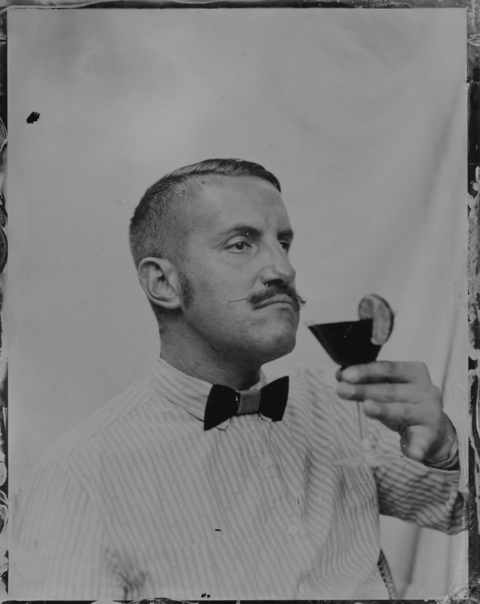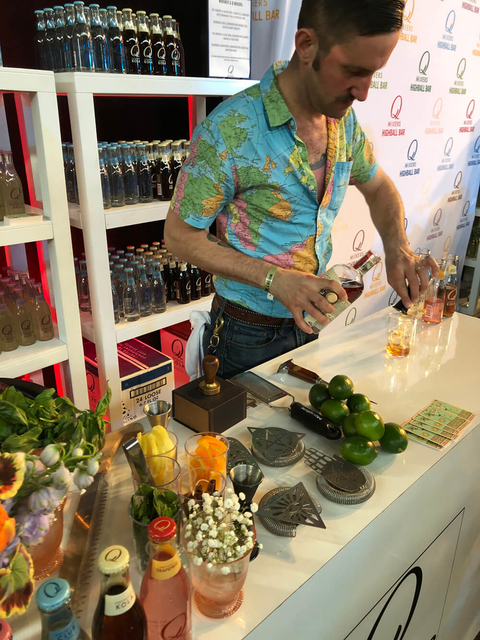Matt Levy, founder and operator of the Covert Cocktail Club in Brooklyn, doesn’t consider himself a professional bartender or bar owner.
This is despite El Silencio and Q Mixers having flown him to events to be their bartender. Instead, he refers to himself as a “professional home bartender,” saying he could “never hold a candle” to professional bartenders.
Levy is an entertainer and an educator, hosting an educational experience for a broad spectrum of cocktail consumers, from neophyte to aficionado. And in addition to teaching his guests about spirits and cocktails, he can teach operators and managers about service, the guest experience, and managing guest expectations.
Running a home bar is different than operating a bar or restaurant, obviously. For instance, Matt sends out an email that helps guests find CCC and manage their expectations before they arrive:
- The house is in Bushwick, a neighborhood in Brooklyn.
- Look for the lit up “COCKTAILS HERE” sign in one of the windows.
- Enter unannounced.
- Guests are to remove their shoes.
- For $80, guests receive four cocktails, assorted shareable snacks, and an educational experience.
Most bars don’t serve just one to ten guests in an evening, and they probably don’t send out emails explaining the experience guests can expect. And nobody wants guests to remove their shoes inside a bar or restaurant. Those elements notwithstanding, CCC isn’t that far removed from a “regular” operation.
Service, the Unwritten Contract
Like most bars, a balance is struck between the guest experience, drinks, and guest expectations. How that balance is approached factors when into a venue’s identity. Some let their drinks do the talking, some place more emphasis on service.
We’ve all heard or read at least one review of a bar that described service and an experience so impressive that average drinks are forgivable. We all hope experience, service and cocktails wow in equal measure, but sometimes one element stands out above the rest.

“What I do is much more customer and experience constructed, with cocktails coming in as a very close second in command as compared to say, cocktails with an experience as a second in command,” says Levy.
For CCC, the balance is clear—the guest experience comes first. Levy, with his encyclopedic knowledge of spirits and cocktails, some long since forgotten, could easily adopt the elitist attitude toward his guests that unfortunately plagued many cocktail bars not long ago. He’d much rather embrace the same commitment to service that he sees the top bars in New York City, his hometown. He proudly informed me that the days of the pretentious bartender are over.
Levy starts the CCC experience before guests show up for their reservations. The instructional but welcoming email sets the tone and makes it clear that guests are in for something special, mercifully free of pretention.
“The customer experience is of paramount importance regardless of what you do and where you do it,” Levy says.
Providing a mediocre or flat-out bad guest experience really isn’t excusable. Yes, people go into business to make money. But this is the hospitality industry—if you aren’t more passionate about putting others before yourself than you are about money, this may not be the right business for you.
Check this out: Adapt or Die: How to Change Gears to Meet Guest Expectations
That point isn’t lost on Levy. He didn’t have o open his house up to strangers, share his knowledge of cocktails and spirits, and dedicate time and effort to creating drinks. The moment he made the choice to open CCC he knew he was obligated to provide as amazing a guest experience as possible.
When a person chooses to enter this business, from owner to seasonal employee, they’ve made the choice to enter into an unwritten contract. The agreement is to deliver great, consistent products and service. Good isn’t good enough in today’s competitive, disruption-prone market, and bad is, well, bankruptcy.
Top-Notch Guest Experience
The evening before we spoke, Matt had hosted seven guests: two couples who arrived as a group of four, a solo male, and a father and daughter duo. Within the group of four was a native French speaker from Bordeaux and his American girlfriend who teaches French. For most of the evening, that group conversed with one another in French. The other three guests engaged with each other and interacted with Matt, asking questions.
Guests are expected to be present and involved throughout their time at CCC. However, Levy doesn’t “rope in” his guests anymore than they want to be involved. He’d also like guests to avoid some topics of conversation, but as he says, he’s not their mother or grandmother. Of course, Levy does have a benchmark for what he considers the ultimate CCC moment:
“The best experience for attending the Covert is when people get up from their seat—they’re more or less assigned seats next to their dates, next to their friends—walk over to the far end of the bar, which is my kitchen island, and just insert themselves into other conversations that are already happening,” he says. “And when that happens, that makes me ecstatic, because that’s the point of this thing.”
A Great Bartender is Never Just a Bartender
CCC, serving just ten guests in an evening, is about as intimate a cocktail experience out there. But even in fast-paced, high-volume situations, great bartenders separate themselves from the rest by providing great service. There’s really no such thing as being “just a bartender.”
As arguably the most guest-facing position in a bar or restaurant, bartenders are hosts, ambassadors, guides, educators, entertainers, friends, and counselors. Whether serving one guest or 100, bartenders (any guest-facing role, really) need to keep smiles on their faces, anticipate guest needs, and deliver top-notch service.

“The most important thing is to be comfortable in your space and to be able to manage expectations before they walk in the door,” says Levy.
Like any great bartender or host, he knows that he’ll sometimes need to help his guests arrive at his favorite moment of the experience.
“I’ll engage in some verbal cues,” Levy says. He’s not just talking and teaching, he’s listening and reading the room, which speaks to the importance of a bartender’s comfort and familiarity with their space. Encouraging guests to engage with one another is as easy as listening to what guests are talking about, finding a common subject, and as Levy describes, stitching disparate conversations together.
Check this out: Brand Identity Separates Bars and Restaurants from Successful Destinations
If he were uncomfortable in his space, Levy’s educational experience would never have succeeded. When making new hires or analyzing a bar team, operators are well served to look for comfort level. Interviews aren’t the most comfortable situation for everyone but throwing a potential hire behind the bar as part of the process will likely reveal much about their personality. When a professional makes the bar they work behind their home, they make their job easier and improve the guest experience. Achieving the idea comfort level encompasses everything from mis en place to attitude.
When a bartender knows where everything is, service becomes muscle memory and they can remain engaged with guests while they work. When they go in for their shift with the attitude that they’re hosting guests in their “home,” they provide elevated service. No matter who walks through the doors, bar pros and Levy make or break the experience—and the business—through their treatment of strangers. When serving regulars, they must avoid missteps in consistency.
Managing Expectations by Managing Energy
For Levy, it’s not odd to have up to ten strangers walk into his house two to three nights per week, four weeks a month. What’s intense, as he describes it, is the outlay of energy. Most people in the bar and restaurant world—particularly those with multiple jobs—should be able to relate.
The day before our conversation, Levy worked his day job operating a NYC tour company while the UN Assembly was in town. There was more traffic than usual, the tour took close to six hours, and it was a stressful workday. He came home to a cranky baby, so he took her to the park before getting ready for a dinner party he and his wife had committed to attend. Levy then needed to return home, prep his bar, and serve seven strangers cocktails while educating them, keeping his energy up, managing their expectations, and delivering an experience that would be worthy of more positive word-of-mouth advertising.
Today’s guests aren’t just more knowledgeable about spirits, beer, wine and cocktails, many are just as thirsty for information as they are for a well-crafted drink. There’s a debate or whether encouraging inquisitive guests and nerding out with them is good for business. Examining the role of bartender and whether it’s an educational position is part of that debate.
Levy would passionately argue that bartenders are educators. He estimates that he spends six to 12 hours per week educating himself about the cocktail and bar world. Acquiring knowledge entails reading books, sifting through websites, listening to podcasts, and conversing with bar professionals (some of whom have visited CCC).
That may seem like a lot to pile on top of his other responsibilities, something else that should sound familiar to owners, operators and other pros. For Levy, the juice is worth the squeeze. Through a series of uncontrollable circumstances, Levy once found himself hosting a single guest. Some people had to cancel their reservations at the last minute, some simply flaked.
Check this out: This Exciting New Bar Technique is Changing Everything
On paper, the lone guest was less than Levy’s ideal. She was curious about CCC but was a wine drinker, not a fan of cocktails. Like any professional bartender in this situation, Levy had to make a choice: serve his guest’s orders and hope for the best; disengage and deliver the bare minimum the financial transaction commanded; or ramp up his energy, make his guest feel welcome and comfortable, and share the cocktail gospel.
Levy’s choice should be obvious. He was ecstatic to transform a wine drinker into someone who can now appreciate a cocktail. She had a eureka moment that Levy had the privilege of witnessing, declaring that she finally “got it.” Levy’s positive energy, passion for service, cocktails and education, and commitment to providing a memorable experience sparked a new, lucrative interest in his guest. A passionate, professional bar team should be capable of achieving the same results.
Resources
